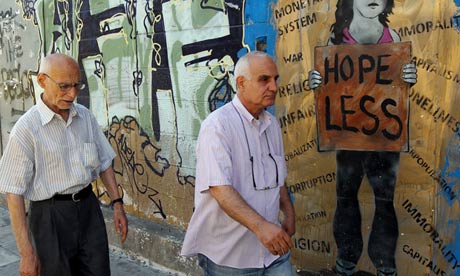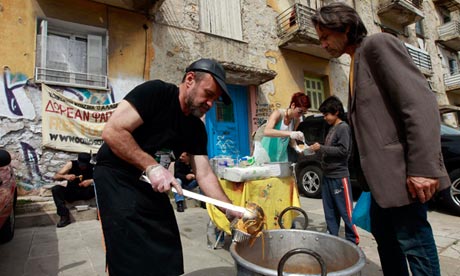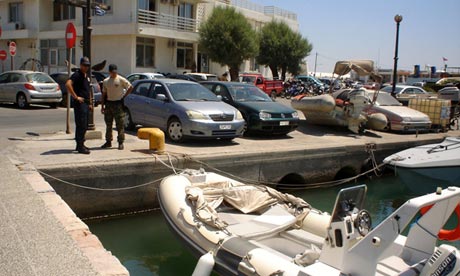Reuters in Athens The Guardian, Tuesday 13 August 2013
Greek government in danger of missing bailout targets unless tax revenues improve
Greeks are facing a sixth consecutive year of recession as austerity measures bite into private consumption. Photograph: Orestis Panagiotou/EPA
Greece's recession eased slightly in the second quarter of 2013 but not nearly enough to boost tax revenues to levels the government needs to meet its bailout targets, figures showed on Monday.
The news followed a magazine report that said Germany's central bank saw risks to the rescue package aimed at keeping Greece afloat and expected Athens to need more aid in 2014 after it scraped through the last aid review.
As Europe's largest economy Germany has funded a large proportion of the Greek bailout but there has been resistance from German voters, who are also facing tight budgets. The subject of Greek aid has played into the campaign for elections next month.
The Greek data showed the economy shrank at an annual pace of 4.6% in the second quarter, according to the country's statistics agency Elstat.
The economy has slumped 23% in real terms since 2008, hurting tax revenues and making it hard to meet targets agreed with international lenders who backed the 2010 bailout.
The figure was slightly better than economists' average forecast for a 5% contraction, but that will be cold comfort for Greeks, who are facing a sixth consecutive year of recession in 2013, as austerity measures have crippled private consumption, the main engine of its economy.
The slump, one of the biggest peace-time recessions recorded in history, is undermining the ability of firms and households to pay taxes, separate budget figures showed on Monday.
Gross tax revenues lagged behind targets by about €1.5bn (£1.3bn) in the first seven months of the year, hit by record unemployment of nearly 28%and a wave of corporate bankruptcies.
The government managed to plug the budget hole by cutting spending, withholding tax refunds, freezing public investment and cashing in a much higher amount of European Union subsidies than initially planned. But Athens will not sustainably fix its finances unless it boosts tax revenue, the EU and the International Monetary Fund have said.
Greece may fall short of its budget targets this year because a large part of planned tax revenues has not been cashed in yet, lenders warned last month. Athens aims to have a primary budget surplus, before interest payments, in 2013, to qualify next year for additional debt relief promised by its euro zone partners.
However, economists said the second-quarter GDP figures may show that the worst of the recession may be over. "Recession will decelerate in the third quarter, helped by tourism, and in the fourth, helped by base effects," said Dimitris Maroulis, an Athens-based economist with Alpha Bank.
Manufacturing expanded at its fastest pace in five years in June and tourism revenues in May also jumped more than expected.
"That means that recession will not exceed 4.2% this year," Maroulis added. That would be in line with a current forecast by the government and its lenders, who have provided Athens with about €240bn in bailout funds since mid-2010.
The Greek economy is expected to recover at an anaemic pace of 0.6% next year and accelerate after 2015. The forecasts help determine the country's future finance needs and whether Athens might need even stricter austerity to meet its bailout targets.
Greece, the EU and the IMF will update growth forecasts when they meet for a round of bailout talks in September and October. The outcome of these talks will determine whether Athens will needs to adopt harsher austerity measures to keep receiving bailout funds – a prospect which its fragile coalition government has repeatedly ruled out.
Positive growth rates and a potential primary surplus would allow Athens to return to bond markets, from which it has been excluded for four years, Greece's finance minister Yannis Stournaras has said. The Greek statistics service does not provide seasonally adjusted figures or data on quarter-on-quarter changes.
Greece recession eases but not enough to boost tax revenue | World news | The Guardian
![The [Greek] European Tragedy](https://blogger.googleusercontent.com/img/b/R29vZ2xl/AVvXsEiWKI5s90SFm1wWTk6bs4p7CgslaC2SnYPsrZhb-B-smOufNNCSxCvpBLI9hOB-LsXZjir_PNmEiMk2-E62F3xkg96IoC6QFAaZAnPRTVH340IN9WBRmWJqPkjWlgyRj3zpALp7h6hvA58/s920/GkBack_new.jpg)





